Wife Asks If She's Wrong To Say No To A New Dog Her Husband Wants
Getting a new dog may be exciting, especially if you imagine all the fun moments you could have with them, but bringing a new dog into a home is not easy. If you live alone, all you have to think about is yourself, but when you live with other people, you'll have to plead your case for good reason.
Having a dog in a home is not a simple thing. You have to consider their care, the messes they'll make, their noise, their daily needs, and so much more.
And if you live with other people, you'll also have to consider their needs and opinions. In a household, it has to be a vote because whether you like it or not, they'll be part of the dog's life, and the dog will be part of theirs.
That's why you have to make sure that they can coexist in each other's lives well enough before bringing a new pup home.
Unfortunately, Redditor SeparateElderberry56's husband doesn't seem to understand that. He thinks that just because he wants a new dog, he'll get a new dog despite his wife and daughter's protests.
Even with the threat of his relationship with his wife and daughter being altered, he's still adamant about getting a new dog. Here's the whole story.
OP asks:

The husband said he regrets his past treatment of their old dog and now wants a do-over with a new one
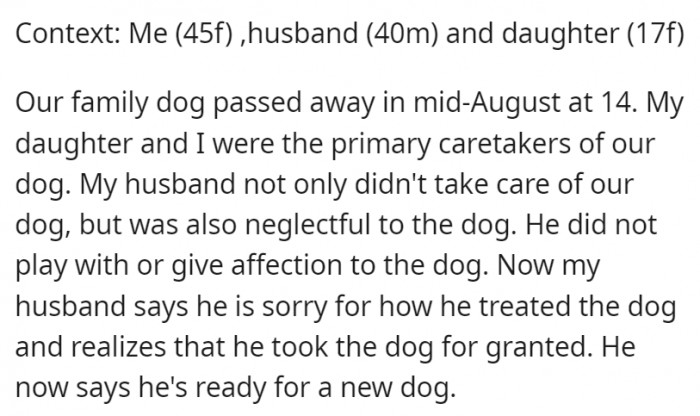
However, both mother and daughter think it's the worst time for a new dog
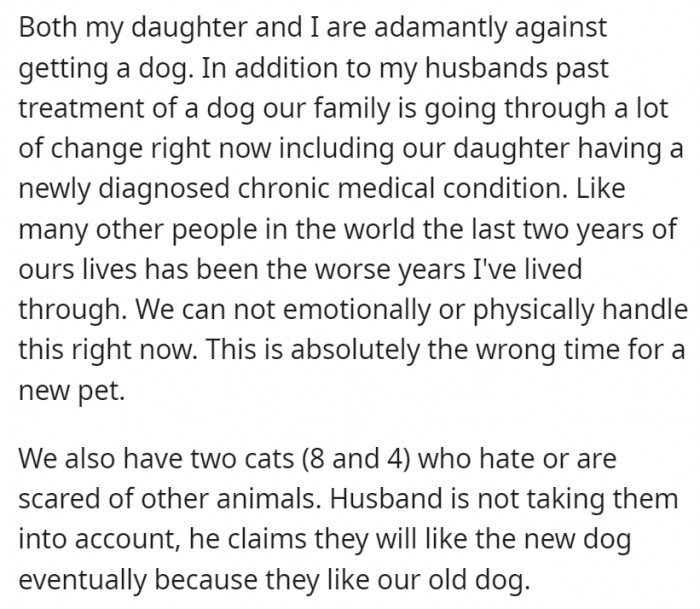
Attachment Styles and Relationship Challenges
Dr. John Bowlby, a pioneer in attachment theory, explains how early relationships shape our expectations in adulthood.
His research shows that individuals with a history of neglect or inconsistent caregiving may struggle with trust and commitment, impacting their ability to nurture future relationships.
In this case, the husband's history with their past dog likely influences his desire for a new pet, potentially reflecting unresolved guilt or longing for connection.
Understanding Attachment Styles
Attachment theory, developed by John Bowlby, plays a critical role in shaping how individuals relate to pets and partners. In this case, the husband's previous neglect of their dog may reflect a deeper attachment style rooted in avoidant behaviors. Research indicates that individuals with avoidant attachment styles often struggle with emotional availability, leading to difficulties in nurturing relationships.
Understanding these patterns is essential for addressing the underlying issues. By recognizing how early experiences influence current behaviors, couples can work towards developing healthier relational dynamics.
They have completely valid reasons for going against a new dog, but the husband will be picking one up anyway
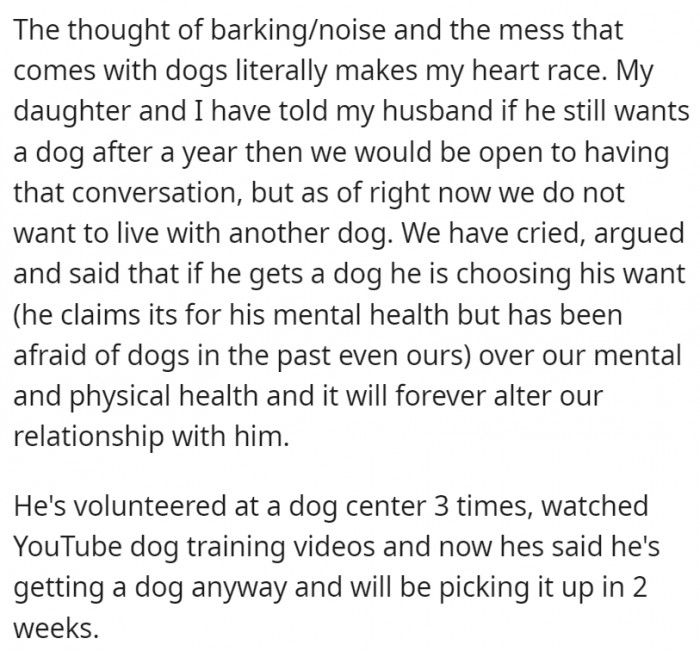
In another time and another situation, the husband's declaration that he wants to try again for a new dog might have made the mother and daughter happy, but as OP explained, it's probably the worst time for them to get a new dog. In addition to that, it seems that they are unsure how the husband would be with a new dog given his history with their old one.
Their reasons are completely valid, but unfortunately, it seems that the husband is simply ignoring their opinions, which seems rude and inconsiderate. He appears to be following his own wants, and many people in the comments section think so too.
Here are the best comments.
1. Tell the person giving him the dog that everyone else is not on board with it

2. A reputable breeder would know not to put a dog in a household where not everyone wants the dog

Research from the Journal of Family Psychology indicates that decision-making about pets can reveal underlying relationship dynamics.
When one partner feels disregarded or unsafe due to previous experiences, it can lead to conflict over seemingly trivial matters, like acquiring a new dog.
It's essential to explore these emotional layers, as they can illuminate the real issues at play in the relationship.
Moreover, the wife's resistance to getting a new dog underscores the importance of trust in relationships. According to Dr. Sue Johnson, a clinical psychologist and founder of Emotionally Focused Therapy, trust is built through consistent and reliable behaviors. The husband's admission of having taken their previous pet for granted may be a step towards rebuilding that trust, but it requires consistent follow-through and accountability.
3. Stop the transaction early
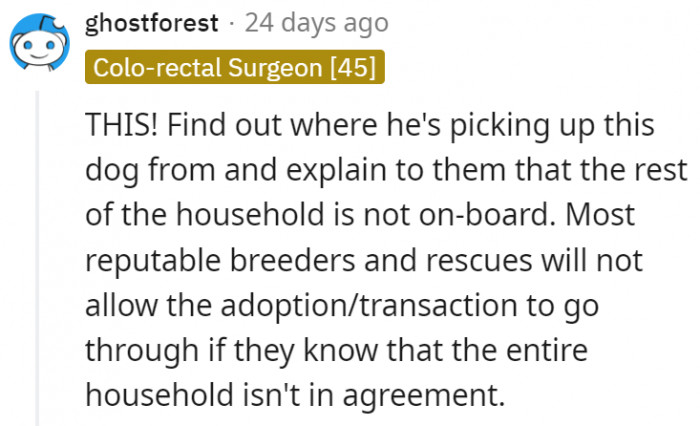
The husband also doesn't seem to care much about their child's health issues
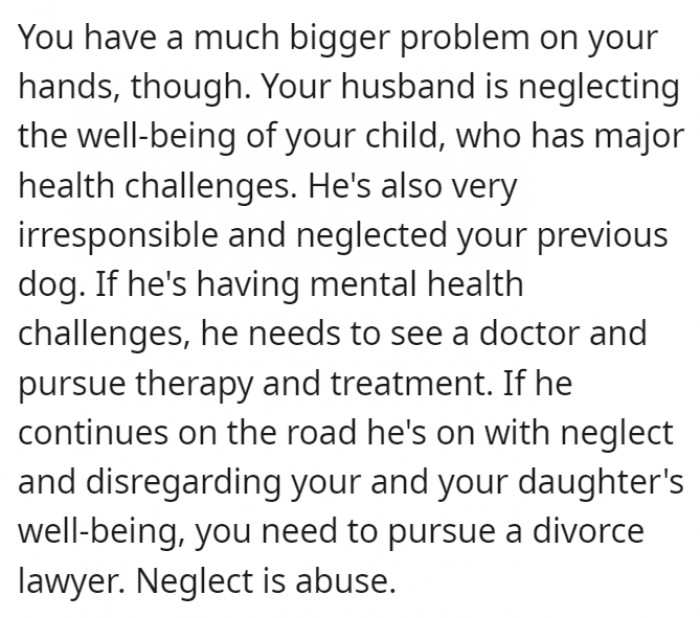
4. History can repeat itself, and OP might end up taking care of the dog again
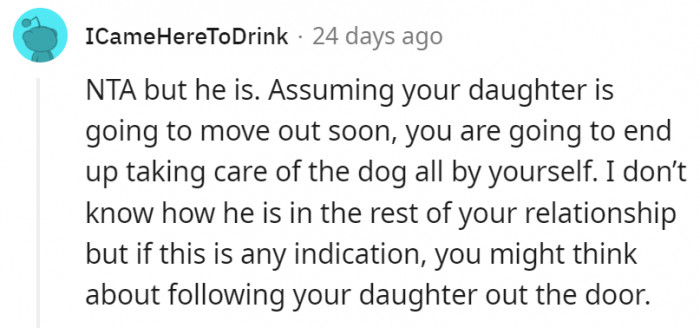
Communicating Needs and Concerns
Effective communication is vital when navigating difficult topics in relationships. Dr. Marshall Rosenberg's Nonviolent Communication framework emphasizes the importance of expressing needs without blame.
This approach encourages partners to articulate their feelings and desires openly, fostering understanding and reducing conflict.
By discussing past experiences with the previous dog, the wife can help her husband understand her hesitations and fears regarding a new pet.
The Role of Communication in Relationships
Effective communication is critical in navigating disagreements about pet ownership. Research suggests that couples who utilize constructive communication methods are more likely to resolve conflicts amicably. Techniques such as active listening and expressing feelings without blame can help both partners feel understood and valued.
Encouraging open conversations about fears and expectations surrounding pet ownership can facilitate a more collaborative decision-making process. Couples should aim to express their thoughts while remaining receptive to each other's perspectives.
5. It's wrong to bring a dog into an environment where it might not be taken care of properly

6. Maybe the husband could consider fostering first

7. It sounds like the husband's behavior is a pattern
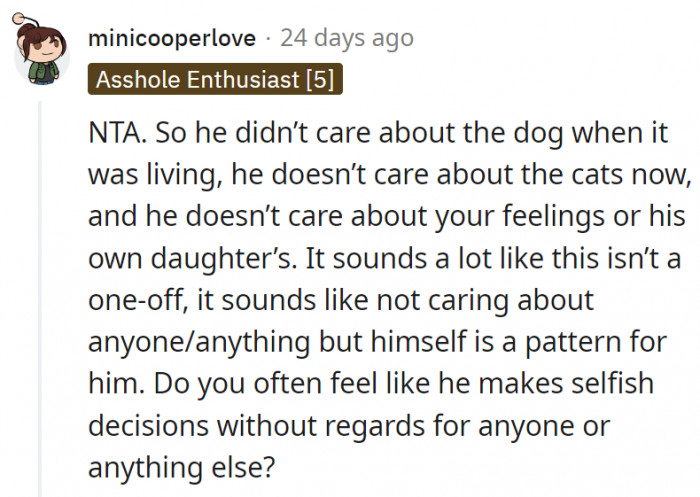
Studies show that perceptions of neglect can lead to defensive behavior in relationships.
When individuals feel their needs were not met in previous situations, they may become resistant to new commitments, fearing a repeat of past disappointments.
Addressing these concerns with empathy can create a safer space for both partners to express their feelings and concerns.
Additionally, exploring the emotional implications of pet ownership is important. Pets often serve as sources of unconditional love and companionship, which can be particularly important in times of stress. The American Psychological Association highlights that the bond between humans and animals can significantly enhance emotional well-being. Therefore, understanding the emotional significance of a new pet for both partners is essential.
8. The husband doesn't seem to realize that everyone's against him
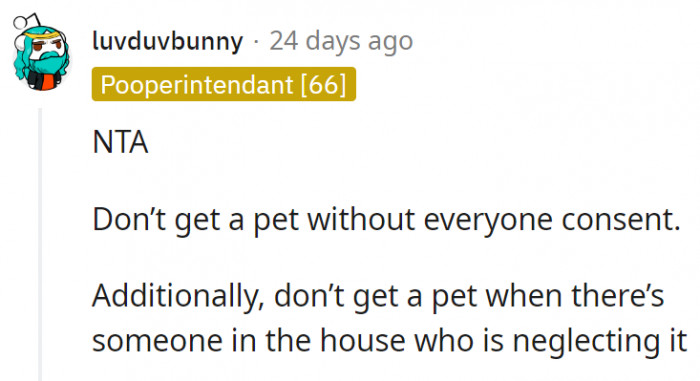
9. He should face the consequences of his actions if he were to get a dog
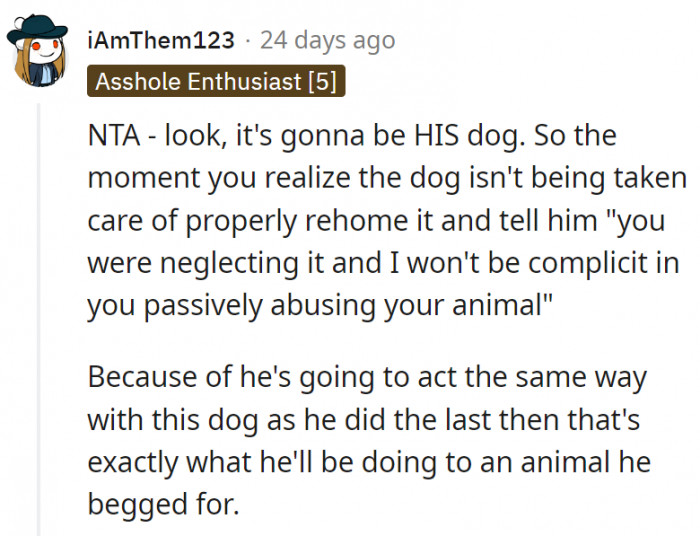
10. It's not even certain he's truly learned his lesson

Strategies for Joint Decision-Making
Research suggests that collaborative decision-making enhances relationship satisfaction.
Dr. William Doherty advocates for couples to engage in joint discussions about significant choices, like bringing a new pet into the home.
By establishing mutual understanding and respect for each other's feelings, couples can navigate their differences more effectively and strengthen their bond.
Practical Strategies for Compromise
When navigating disagreements about pet ownership, finding common ground is essential. Couples can engage in a structured discussion where both partners express their concerns and desires regarding a new dog. Research indicates that compromise strategies, such as setting mutually agreed-upon criteria for pet ownership, can lead to more satisfactory outcomes.
For instance, they can establish guidelines regarding responsibilities and expectations for caring for the new pet, ensuring both partners feel heard and involved in the decision-making process.
11. If he's going through something, getting a dog isn't the solution
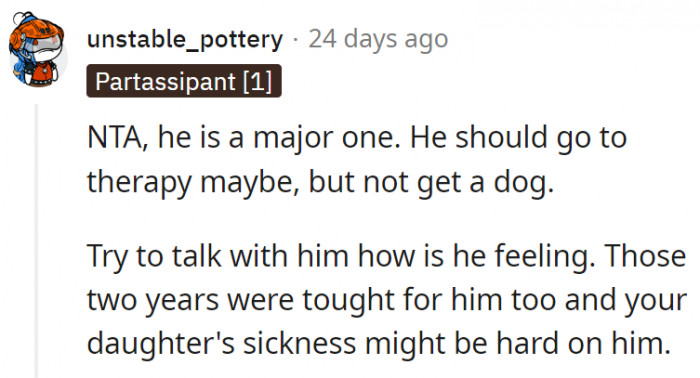
12. The husband needs therapy, not a dog
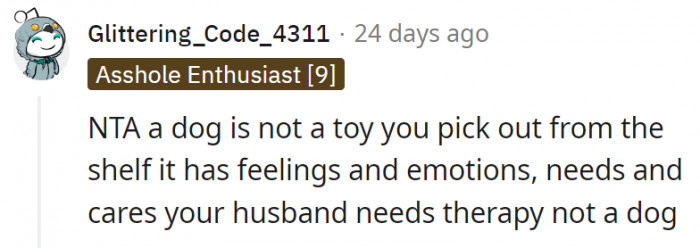
13. The husband can continue volunteering to get his dog fix instead of tearing up his family the way he's doing
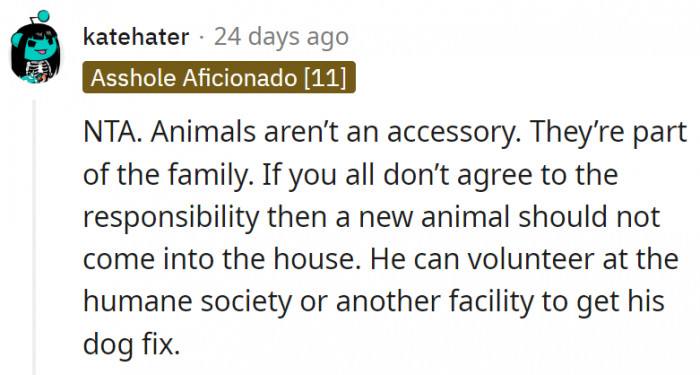
Moreover, considering temporary arrangements, such as fostering a dog, could be a viable compromise. This can allow the husband to demonstrate his commitment to responsible pet care while easing the wife's concerns. According to studies, trial experiences can alleviate anxiety and provide both partners with insights into their readiness for new responsibilities.
14. The dog might be a sign it's time to move on

15. Dogs aren't for people who aren't ready for them

16. The husband needs to sort out his priorities
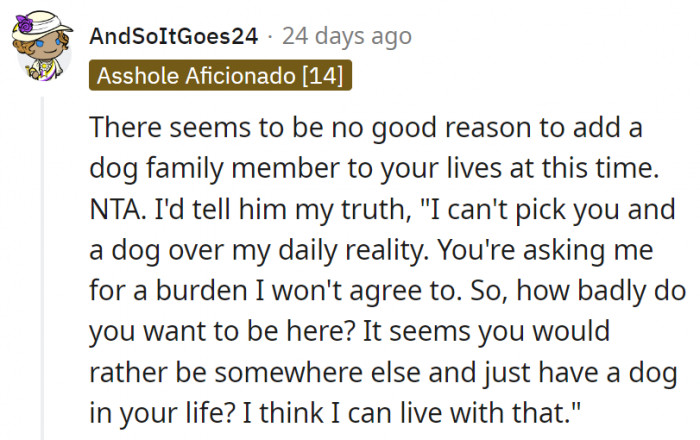
Building Trust Through Accountability
Ultimately, rebuilding trust is a gradual process that requires consistent actions. The husband can take proactive steps to show his commitment to responsible pet ownership by engaging in discussions about care routines and responsibilities. Research indicates that accountability fosters trust, and being transparent about efforts can strengthen their partnership.
Engaging in joint decision-making and shared responsibilities can enhance their bond and provide a foundation for a healthier relationship moving forward.
17. See if he changes his ways first
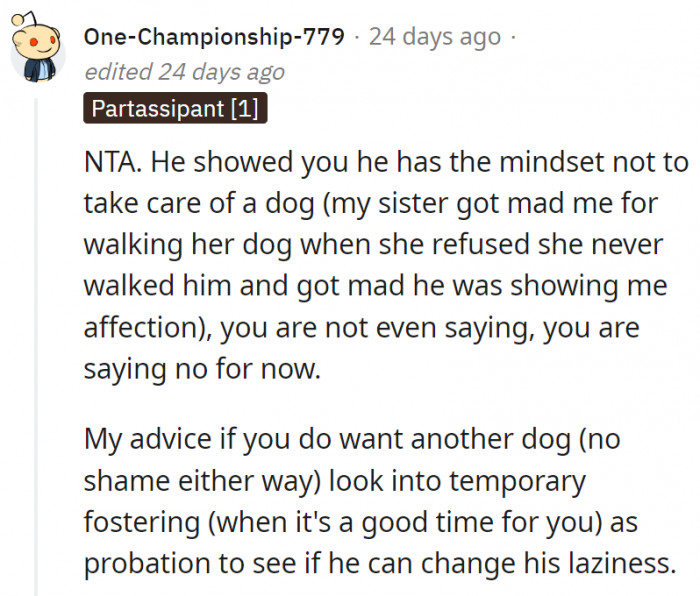
18. Get him to do all the hard work
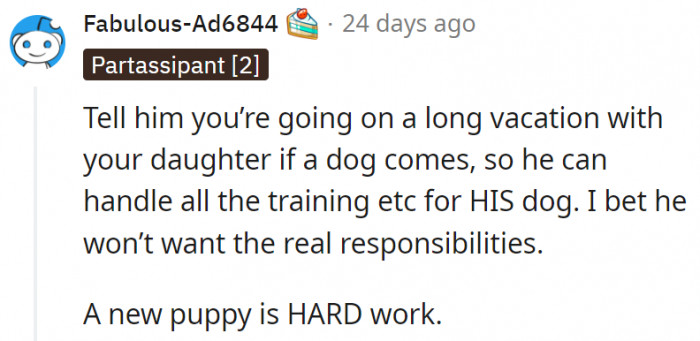
19. It needs to be a unanimous decision

In conclusion, addressing the complexities of pet ownership requires a multifaceted approach that considers attachment styles, communication, and emotional significance. By fostering open dialogue, establishing trust, and seeking compromises, couples can navigate these discussions effectively. Ultimately, a shared vision for pet ownership can enhance the emotional connection between partners and lead to a more harmonious relationship.
20. The husband needs to prove that he's truly going to step up before getting a permanent new dog
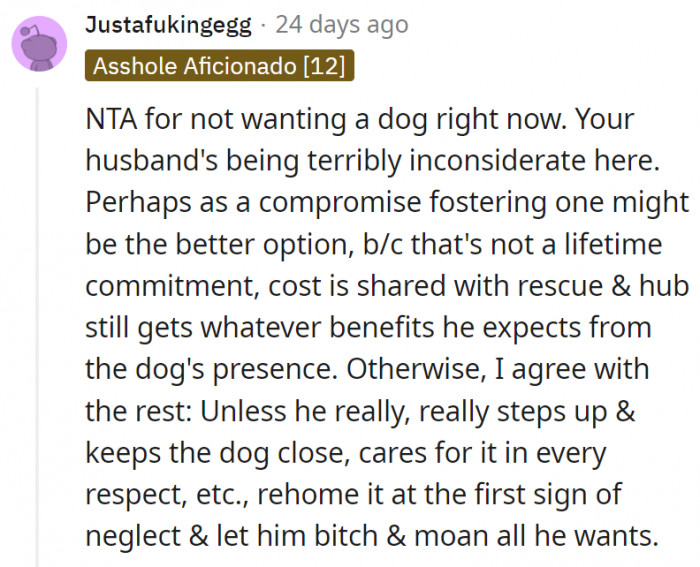
Getting a new dog requires a unanimous decision from the household, and the husband needs to understand that. It's odd that he seems to be ignoring every valid reason his family has against getting a new dog.
If he really wants one, though, he should prove that he'll be responsible not only at the start but until the very end. Otherwise, he's just asking for trouble.
What do you think?
Psychological Analysis
This situation reflects common tensions in relationships where past experiences shape current behaviors. It's important for partners to openly discuss their feelings and establish a mutual understanding of responsibilities regarding pet ownership. Engaging in these conversations can significantly improve trust and collaboration in the relationship.
Analysis generated by AI
Analysis & Alternative Approaches
In summary, understanding the underlying psychological factors influencing pet ownership discussions can help couples navigate their differences more effectively. Building trust through consistent communication and accountability is crucial for successful relationships. As noted in American Psychological Association resources, fostering mutual understanding can pave the way for healthier decision-making processes.
Analysis & Alternative Approaches
Understanding the psychological factors at play can significantly aid couples in resolving conflicts over sensitive issues.
According to numerous psychological studies, addressing emotional histories and fostering open dialogue are key to successful outcomes in relationships.
With patience and understanding, couples can create a supportive environment for discussing their desires and fears.



